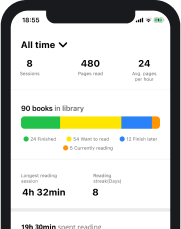The fact that all readers are different in their own ways is well-known. The preferences in terms of author, style, and genre differ from one person to another and that is perfectly natural and beautiful. Our diversity as a species is one of the things that makes us special and one that we should embrace and appreciate.
When it comes to readers, we tend to be a different breed altogether. We have our habits and our quirks, and we get our energy and wisdom from books written decades, or even centuries ago. While the authors, genres, and topics are completely natural and common things to take into consideration when choosing a book to read, many of us bookworms have very particular tastes in terms of format as well.
The battle between paperback vs hardcover books has been ongoing for as long as I can remember, and since we are dedicated to approaching every single possible topic that is related to books and reading here at Basmo, it’s time to finally see which one is actually better.
Before going any further in exploring the differences between the two and doing our hardcover vs paperback comparison, let’s first make sure we are on the same page in terms of what each one means
What is a hardcover book?
As the name suggests, a hardcover book, also known as hardback is one that is bound with a rigid protective cover. The covers are usually made of heavy paperboard, binder’s board, hard paper, buckram, or sometimes leather. The spine is generally sewn, which makes it flexible and yet durable.
Hardcover books are generally printed on acid-free paper and they are more durable and last longer in time, but are more costly to manufacture and therefore end up in the bookstores at a considerably higher price than paperback books.
What is a paperback book?
A paperback is defined as a book that has very thin protective covers, generally made out of slightly thicker paper or thin cardboard. The spine is simply glued to hold all the book pages together, instead of being sewn like in the case of hardcover books.
Books released in paperback format are generally cheaper than their hardcover versions, and since production costs played a role in the decision of releasing the book as a paperback, the quality of the other materials used is generally going to be inferior to the ones in hardcover books.
While cutting production costs will result in lower prices for the books when they get to the bookstore shelves, they will also last less in time and will deteriorate faster.
What is the difference between hardcover and paperback?
Understanding the differences between the two and finding out which one is the right choice for you cannot be done without a clear head-to-head hardback vs paperback comparison. We explored both types and found the most important aspects for our comparison to focus on.
Pros and cons of hardcover books
Let’s see what exactly makes hardcover books special and what their drawback are, this way we can easily compare them to paperback and find out which one is the better choice.
Pros of hardcover:
- They look better. Since the focus in manufacturing is on quality rather than cost-saving, hardback books are usually better-looking and more satisfying to touch. And while that may not seem like such a big deal, bookworms are generally suckers for these tiny details that slightly improve the quality of their reading sessions.
- They are printed in lower numbers. Since the production costs are higher, hardcover books are generally printed in fewer copies. That is also why they are considered by many to be collectible items as well.
- They will last longer in time. With top-quality materials, the end result is inevitably going to be a more qualitative product. This means that hardcover books are going to last longer in time, they will deteriorate a lot slower, and they can be considered an investment to a certain extent (multiple generations can share the same hardcover book since they easily last a couple of decades without being given too much care).
- They make great gifts. Giving a passionate reader a hardcover book as a gift is certainly going to be a very appreciated gesture. While paperback books are going to be appreciated as well, the truth is that hardback books hold a special place in a reader’s heart and if you care about that particular reader, this gift is going to hit home really well.
Cons of hardback:
- They are expensive. Using premium materials in the production process never comes cheap, and higher production costs result in higher prices on the bookshelf in bookstores. The prices for the hardcover version of a book can be two or even three times as high as the price for the same book in paperback format.
- They are heavy. For those of us who love reading on holidays, traveling with hardcover books is not that easy. They are much heavier than paperback books, and usually have pretty rough corners which can make them a nightmare to pack and carry around.
Pros and cons of paperback books
Let’s have a look now at paperback books and see how they compare to hardback.
Pros of paperback:
- They are far less expensive. Since production costs are lower, so is the product that reaches the shelves. If you don’t give much value to the way the book looks, feels, and lasts in time, you can easily get more reading done with a low budget if you choose paperback.
- They are easy to carry. Paperback books are the ideal choice for the traveling reader. They weigh a lot less than the hardcover books, take up less space in the luggage and you can easily fit more of them in your backpack if you want to get more reading done on holiday. Since their covers are flexible, they are also less likely to damage other items in your bags.
- More copies are printed. Since the focus is on cutting production costs, paperback books are usually printed in large numbers. This means that you have a lot more chances to get your hands on one to read than if you were looking for the hardback version of the book. Even though they are very unlikely to become collectible items, paperback books are going to quench your reading thirst just as well.
Cons of paperback:
- They won’t last as long. Since they are cheaper to produce, they are also created from inferior materials. This means they won’t take the test of time too well. The covers can be easily broken and the same can happen to the pages. Not only that, but since the pages are only glued together and not sewn to the book spine like in hardback books, they can also become loose after a while.
- They are not collectible items. You are less likely to proudly display a paperback book on your bookshelf and they won’t increase in value over time, regardless of how good the content of the book actually is.
Is paperback or hardcover better?
As much as I would like to provide you with a clear answer to that question, regardless of how well we analyze the differences between the two formats, the truth is that ultimately it is up to you to decide which one is the right choice for you.
While some books are definitely worth paying the extra money for the hardcover version, some are just fine in paperback. We all know that the true value lies within those covers, in the words written by the author and the story that is told.
It is up to you to analyze the pros and cons of each format and see which one works best for you. If you travel a lot and you don’t care that much about the looks of the books you are reading and you’re just interested in the content, paperback might be the right choice: easier to carry, lower costs. If you want to read the books and then proudly display them on your bookshelf or if you think they have the potential to increase in value in the future, go for the hardcover: they look better and they will last longer.
How to keep track of your paperback and hardcover books?
If you are anything like us here at Basmo, your bookshelf is going to be filled to the brim with books in all kinds of formats, both paperback and hardcovers. Some even more avid book enthusiasts are likely to have the same book in both formats. Keeping track of your book collection can be a difficult task, especially if you are an avid collector. Well, it could be a difficult task, but it doesn’t have to be. Thanks to the way we engineered our reading tracking app to suit every single need of the modern reader, it can be of tremendous help to all readers and book enthusiasts, regardless of their preferences and level.
Here’s how Basmo can help.
The app has been designed to allow users to organize their reading in several ways (on which I will elaborate a bit further below), including the possibility of creating separate reading lists. The lists are either generated and updated automatically (as you read books, they get automatically moved from your TBR list to the list of finished books).
On top of the automated lists, users can create custom reading lists, which can be adjusted and updated manually. For example, if you want to keep track of your book collection in terms of the format you own your books in, you can easily create a paperback list and a hardcover list and populate them with the titles you own in each format. As things change (for example, if you decide to buy a hardcover book you already own in paperback), you can easily add or remove the titles from each list.
Since being organized is important not only for keeping track of your collection but also for your reading habits, Basmo also allows you to:
- Set reading goals
- Create a personalized reading schedule
- Take notes while reading
- Keep a reading journal
- Keep track of your feelings as you read
- Analyze your reading statistics ( reading speed, time spent reading)
There’s quite a lot Basmo can help you with in improving your reading habits and your performance as a reader. All you have to do is give it a shot.
Final thoughts on paperback vs hardcover books
While both formats come with advantages and drawbacks, it is in the end a matter of personal taste and preference. At least now you have all the necessary data to make an informed decision the next time you need to choose between a paperback and a hardcover book in the bookstore.







